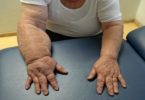What's in this article?
During menopause, estrogen production slows and then stops. When that happens, a number of changes many of them unwelcome happen in a woman’s body. Periods become irregular and then stop. You may have hot flashes, mood swings, a deeper voice, and an increase in facial hair.
Vaginal dryness is another common symptom of menopause and close to one out of every three women experiences it while going through “the change.” And it becomes even more common after menopause. Vaginal dryness also can occur at any age from a number of different causes. It may seem like a minor irritation. But the lack of vaginal moisture can have a huge impact on your sex life. Fortunately, several treatments are available to relieve vaginal dryness.
Vaginal moisture
Natural lubrication produced by glands at the neck of the womb (the cervix) keeps the vagina supple and moist. The moisture moves slowly down through the vagina, keeping it clean and removing dead cells. The vaginal moisture is slightly acidic and this helps to keep the area healthy, preventing infections such as thrush. It is perfectly normal for the majority of women to notice a slight white vaginal discharge.
During sexual excitement the Bartholins glands (two glands at the entrance of the vagina) produce extra moisture to aid sexual intercourse. However, a quarter of women aged 50-59 experience vaginal dryness problems during sex and 16% experience pain
Causes of Vaginal dryness
Reduced estrogen levels are the main cause of vaginal dryness. Estrogen, a female hormone, helps keep vaginal tissue healthy by maintaining normal vaginal lubrication, tissue elasticity and acidity. Other causes of vaginal dryness include certain medical conditions or hygiene practices.
Estrogen levels can fall for a number of reasons:
- Breast-feeding
- Childbirth
- Nicotine dependence
- Cancer treatment (effects on your ovaries from cancer therapy)
- Primary immunodeficiency
- Menopause
- Perimenopause (the transition time before menopause)
- Oophorectomy (ovary removal surgery)
- Use of allergy and cold medications or anti-estrogen medications
Other causes of vaginal dryness include:
- Douching
- Sjogren’s syndrome
How is vaginal dryness diagnosed?
Any burning, itching, or discomfort in the vaginal area warrants a call to your doctor or gynecologist. The doctor will take a health history and find out how long you’ve been experiencing symptoms and whether anything such as douching or taking medication seems to worsen them.
Your doctor will then do a pelvic exam, checking your vagina for any thinning or redness. The exam will help rule out other possible causes for your discomfort, including a urinary tract infection. The doctor may also do a Pap test to remove and test cells from your vaginal wall or cervix.
Alternative Treatments for Vaginal Dryness
Hormone therapy may not be the right treatment for everyone. Replacing natural estrogen can help with dryness, but can also trigger side effects. These include:
- weight gain
- fluid retention
- nausea
- headaches
- breast tenderness
- spotting of the skin
- increased risk of stroke, blood clots, and breast and ovarian cancers
There are several alternatives to estrogen therapy, which work very well and are often worth trying before using estrogen therapy. They include:
- Water-based lubricants, which can help add moisture to the vaginal lining. Their effectiveness can last for hours at a time, making them a good alternative when dryness causes discomfort during sexual intercourse.
- Vaginal moisturizers made specifically for addressing dryness can be used to relieve symptoms for up to three days with just one application.
- Compounds in soybeans and soy products mimic the effects of estrogen. If you add soy to your diet, you may experience some relief from vaginal dryness.
- Black cohosh is an herbal supplement that’s considered by some to relieve menopausal symptoms. There are no significant clinical studies that show its effectiveness.
- Wild yam is another supplemental ingredient that promises to relieve dryness, but evidence from research is lacking.
Talk to your doctor before taking any kind of herbal medicine, as it may interfere with other medications, vitamins, or other herbs you’re currently taking.
In addition to these alternatives, it’s also a good idea to avoid vaginal cleansers or douches. These products will only make dryness worse. And while dryness can make sex uncomfortable, having intercourse more regularly actually promotes natural lubrication.
Vaginal dryness is an uncomfortable condition, but can be managed and treated.
Treatment for Vaginal dryness
The most common treatment for vaginal dryness due to low estrogen levels is topical estrogen therapy. Topical estrogen replaces some of the hormone your body is no longer making. That helps relieve vaginal symptoms, but it doesn’t put as much estrogen in your bloodstream as oral estrogen hormone therapy (HT).
Most women use one of three types of vaginal estrogen:
- Vaginal estrogen ring (Estring). You or your doctor inserts this soft, flexible ring into the vagina. There it releases a steady stream of estrogen directly to the vaginal tissues. The ring is replaced every three months.
- Vaginal estrogen tablet (Vagifem). You use a disposable applicator to insert a tablet into your vagina once a day for the first two weeks of treatment. Then you insert it twice a week until you no longer need it.
- Vaginal estrogen cream (Estrace, Premarin). You use an applicator to insert the cream into your vagina. You will typically apply the cream daily for one to two weeks then reduce the frequency to one to three times a week as directed by your doctor.
Topical estrogen may not be recommended for women who:
- Have breast cancer, especially if they are taking an aromatase inhibitor
- To women with a history of endometrial cancer
- To women who have undiagnosed vaginal bleeding
- To pregnant or breastfeeding women
There isn’t much research on the long-term use of topical estrogen, but doctors believe it is safe to use in the long term.
In order to keep the vagina more lubricated, try using a vaginal moisturizer (Replens, Lubrin), which you can buy at your local drugstore or supermarket. You can make intercourse more enjoyable by applying a water-based lubricant (Astroglide, K-Y) beforehand. Also take your time before having sex to make sure that you are fully relaxed and aroused.
Avoid using douches, bubble baths, scented soaps, and lotions around the sensitive vaginal area. These products can worsen dryness.






Leave a Comment